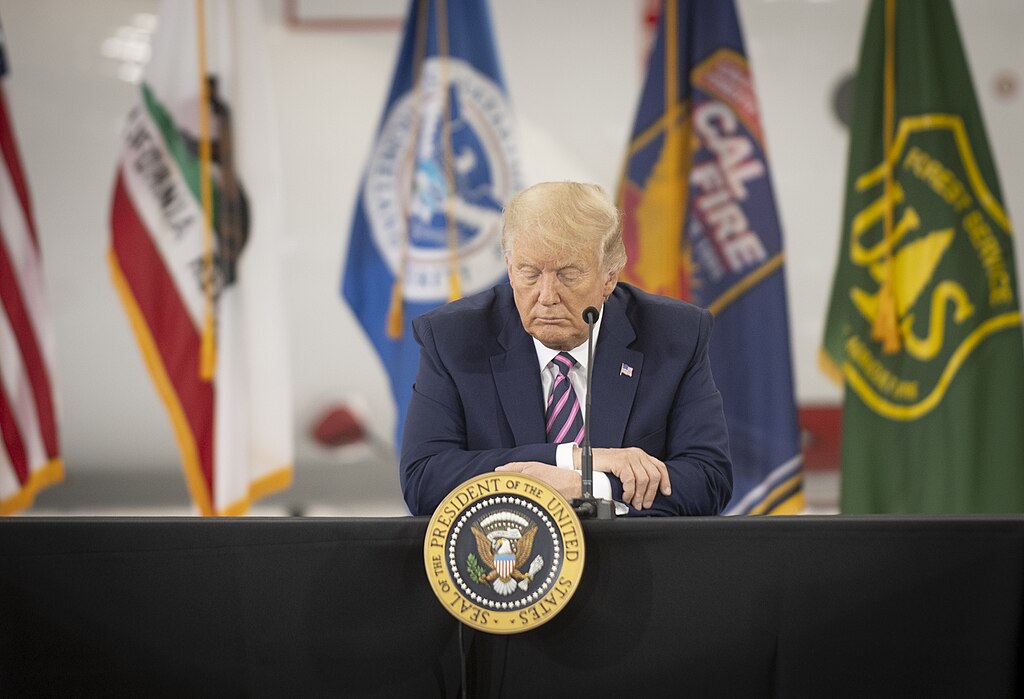Former President Donald Trump is reportedly considering North Dakota Governor Doug Burgum for a new position as “energy tsar” if he is re-elected in 2024, according to sources cited by the Financial Times. This potential role would place Burgum, a prominent supporter of energy deregulation, at the forefront of efforts to roll back federal regulations impacting the energy sector.
Burgum’s Pro-Oil Stance Sparks Regulatory Concerns
Governor Burgum, known for his strong stance on energy independence and support for the fossil fuel industry, could become a powerful figure in Trump’s proposed administration. His responsibilities, sources say, would include reducing regulations that Trump claims have hindered U.S. energy production. A close ally to North Dakota’s thriving oil industry, Burgum has long argued that deregulation is essential for the U.S. to regain energy independence and bolster economic growth.
The prospective appointment aligns with Trump’s previously voiced ambitions to promote “American energy dominance” by scaling back federal environmental regulations. Supporters argue that Burgum’s expertise could streamline production and drive down energy costs, though critics warn that relaxing standards might compromise environmental protections and accelerate climate change.
Environmental Advocates Push Back on Burgum’s Potential Role
Environmental groups have voiced concerns over Burgum’s potential role, warning that increased deregulation could have severe consequences for climate initiatives and air quality standards. His appointment could signal a significant pivot away from current policies aimed at reducing greenhouse gas emissions.
Burgum has yet to comment publicly on the matter, and Trump’s team has not confirmed the appointment. Still, the move is seen as part of Trump’s broader strategy to reshape U.S. energy policy. The discussions come at a time when energy prices and climate policy remain hot-button issues across the country.
The rumored selection highlights Trump’s commitment to prioritizing energy independence, with an emphasis on domestic production over environmental safeguards. Political analysts predict that, if appointed, Burgum’s influence could reshape U.S. energy policy for years to come.



 Iran Supreme Leader Ayatollah Ali Khamenei Killed in Israeli, U.S. Strikes: Reuters
Iran Supreme Leader Ayatollah Ali Khamenei Killed in Israeli, U.S. Strikes: Reuters  Trump to Address Nation as U.S. Launches Strikes in Iran, Axios Reports
Trump to Address Nation as U.S. Launches Strikes in Iran, Axios Reports  Netanyahu Suggests Iran’s Supreme Leader Khamenei May Have Been Killed in Israeli-U.S. Strikes
Netanyahu Suggests Iran’s Supreme Leader Khamenei May Have Been Killed in Israeli-U.S. Strikes  Pentagon Leaders Monitor U.S. Iran Operation from Mar-a-Lago
Pentagon Leaders Monitor U.S. Iran Operation from Mar-a-Lago  Argentina Tax Reform 2026: President Javier Milei Pushes Lower Taxes and Structural Changes
Argentina Tax Reform 2026: President Javier Milei Pushes Lower Taxes and Structural Changes  Australia Rules Out Military Involvement in Iran Conflict as Middle East Tensions Escalate
Australia Rules Out Military Involvement in Iran Conflict as Middle East Tensions Escalate  AI is already creeping into election campaigns. NZ’s rules aren’t ready
AI is already creeping into election campaigns. NZ’s rules aren’t ready  Macron Urges Emergency UN Security Council Meeting as US-Israel Strikes on Iran Escalate Middle East Tensions
Macron Urges Emergency UN Security Council Meeting as US-Israel Strikes on Iran Escalate Middle East Tensions  Why did Iran bomb Dubai? A Middle East expert explains the regional alliances at play
Why did Iran bomb Dubai? A Middle East expert explains the regional alliances at play  Israel Declares State of Emergency as Iran Launches Missile Attacks
Israel Declares State of Emergency as Iran Launches Missile Attacks  Suspected Drone Strike Hits RAF Akrotiri Base in Cyprus, Causing Limited Damage
Suspected Drone Strike Hits RAF Akrotiri Base in Cyprus, Causing Limited Damage  HHS Adds New Members to Vaccine Advisory Panel Amid Legal and Market Uncertainty
HHS Adds New Members to Vaccine Advisory Panel Amid Legal and Market Uncertainty  Israel Launches Fresh Strikes on Iran After Death of Supreme Leader Ayatollah Khamenei
Israel Launches Fresh Strikes on Iran After Death of Supreme Leader Ayatollah Khamenei  U.S. Deploys Tomahawks, B-2 Bombers, F-35 Jets and AI Tools in Operation Epic Fury Against Iran
U.S. Deploys Tomahawks, B-2 Bombers, F-35 Jets and AI Tools in Operation Epic Fury Against Iran  Middle East Conflict Escalates After Khamenei’s Death as U.S., Israel and Iran Exchange Strikes
Middle East Conflict Escalates After Khamenei’s Death as U.S., Israel and Iran Exchange Strikes  UK Accepts U.S. Request to Use British Bases for Defensive Strikes on Iranian Missiles
UK Accepts U.S. Request to Use British Bases for Defensive Strikes on Iranian Missiles  Israel Strikes Hezbollah Targets in Lebanon After Missile and Drone Attacks
Israel Strikes Hezbollah Targets in Lebanon After Missile and Drone Attacks 
































